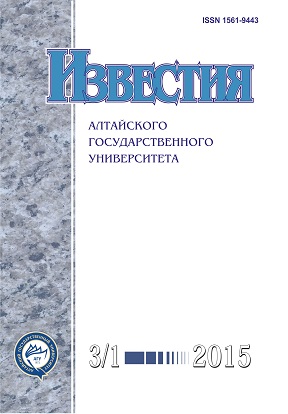The Image of the Elderly and Older Person in Cognition of 20 — to 39-year-old Adults
Abstract
This paper analyses the specifics of images of elderly and older people in cognition of 20 to 39 year-old males and females. The perception of older generation has been considered an important part of gerontological culture, because the content of those perceptions has an essential impact on intergenerational and interpersonal relationships. The psychological studies do not highlight the comparative features of the elderly and older people. This research uses 25 psychosemantic scales that describe five psychological areas: cognitive, emotional, regulatory, communicative and moral - spiritual. The scales are developed by the author based on the Kelly’s Method of Repertoir Grates. The results of empirical study show that adult people of 20 to 39 years of age differentiate the peculiarities of the elderly and older people well enough. The image of the elderly person in overall is positive and can be compared with that of the average adult person. The image of the older person, on the other hand, is negative and has more stereotypical features. The estimation of different aging features of old people are usually placed either at the negative side of the continuum or significantly lower than those in the representatives of other age groups when they are evaluated higher. This tendency displayed prominently during the estimation of will qualities. The adult people of 20 to 39 years old successfully distinguish the images of the child and old person which did not confirm the common stereotype “The old and the kid are the same”.
DOI 10.14258/izvasu(2015)3.1-11
Downloads
Metrics
References
Лемиш В.В. Геронтокультура как социально-психологический феномен // Известия Рос. гос. пед. ун-та им. А.И. Герцена. - 2012. - №148. это отчасти связано с тем, что родители многих наших ющиеся к пожилому возрасту, поэтому данный воз-респондентов - это пожилые люди либо приближараст оценен так высоко.
Лемиш В.В. Феномен геронтокультуры: проблемы исследования // Известия Рос. гос. пед. ун-та им. А.И. Герцена. - 2006. - №6(14).
Бочаров В.В. Антропология возраста : учеб. пособие. - СПб., 2001.
Кон И.С. Ребенок и общество: историко-этнографическая перспектива. - М., 1988.
Краснова О.В. История старости как история формирования аттитюдов к пожилым и старикам в обществе // Психология зрелости и старения. - 2001. - №1(13).
Микляева А.В. Возрастная дискриминация как социально-психологический феномен : Ч. I [Электронный ресурс]. - URL: http://www.humanpsy.ru/miklyaeva/age.
Микляева А. В. Возрастная дискриминация как социально-психологический феномен : Ч. II [Электронный ресурс]. - URL: http://www.humanpsy.ru/miklyaeva/age-2.
Крючкова Н.В. Специфика проявления концептуальных признаков в лексической системе языка и в ассоциативных связях (на материале концепта старость в русском языке) // Вестник Томского гос. пед. ун-та. - 2006. - Вып. 5(56).
Зайцева Ю.Б. Особенности представления о старых людях в различных социально-демографических группах // Психология зрелости и старения. - 2007. - №4(40).
Альдохина Е.Н. Стереотипные представления детей и подростков о пожилых людях // Психология зрелости и старения. - 2002. - №3(19).
Глухова И.Ю., Зыкова М.Н. Специфика образа старости в различных возрастных группах // Психология зрелости и старения. - 2008. - №1(41).
Крайг Г Психология развития. - СПб., 2000.
Радина Н.К. Возрастная динамика «образа старости» в социальных представлениях женщин // Ананьевские чтения - 2005 : матер. науч.-практ. конф. - СПб., 2005.
Смолькин А.А. Парадоксы отношения к пожилым людям в современной России // Социологический журнал. - 2008. - №3.
Тукумцев Б.Г., Юсупова О.В. Отношение молодежи к пожилым людям // Психология зрелости и старения. - 2002. - №3(19).
Подрядчикова И.В. Социальные представления русских и казахов о старом человеке // Психология зрелости и старения. - 2008. - №3(43).
Рыбаков Н. С., Рыбакова Н.А. Проблема старости в историко-философском контексте // Полигнозис. - 2009. - №1(34) [Электронный ресурс]. - URL: http:// www.polygnozis.ru/default.asp?num=6&num2=431.
Смолькин А.А. Исторические трансформации социального статуса старости // Клиническая геронтология. - 2007. - Т. 13. - №3.
Бовина И.Б. Социальная психология здоровья и болезни. - 2-е изд., испр. и доп. - М., 2008.
Еремеев Б.А. Уровни категоризации при понимании человека человеком и при психологическом изучении понимания // Мир психологии. - 2001. - №3(27).
Петренко В.Ф. Основы психосемантики. - 2-е изд., доп. - СПб., 2005.
Франселла Ф., Баннистер Д. Новый метод исследования личности: Руководство по репертуарным личностным методиками : пер. с англ. - М., 1987.
Наследов А.Д. Математические методы психологического исследования. Анализ и интерпретация данных : учеб. пособие. - СПб., 2004.
Izvestiya of Altai State University is a golden publisher, as we allow self-archiving, but most importantly we are fully transparent about your rights.
Authors may present and discuss their findings ahead of publication: at biological or scientific conferences, on preprint servers, in public databases, and in blogs, wikis, tweets, and other informal communication channels.
Izvestiya of Altai State University allows authors to deposit manuscripts (currently under review or those for intended submission to Izvestiya of Altai State University) in non-commercial, pre-print servers such as ArXiv.
Authors who publish with this journal agree to the following terms:
- Authors retain copyright and grant the journal right of first publication with the work simultaneously licensed under a Creative Commons Attribution License (CC BY 4.0) that allows others to share the work with an acknowledgement of the work's authorship and initial publication in this journal.
- Authors are able to enter into separate, additional contractual arrangements for the non-exclusive distribution of the journal's published version of the work (e.g., post it to an institutional repository or publish it in a book), with an acknowledgement of its initial publication in this journal.
- Authors are permitted and encouraged to post their work online (e.g., in institutional repositories or on their website) prior to and during the submission process, as it can lead to productive exchanges, as well as earlier and greater citation of published work (See The Effect of Open Access).








